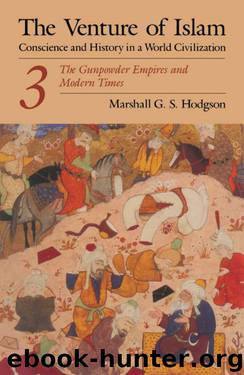The Venture of Islam, Volume 3: The Gunpower Empires and Modern Times by Hodgson Marshall G. S

Author:Hodgson, Marshall G. S. [Hodgson, Marshall G. S.]
Language: eng
Format: epub
Publisher: University of Chicago Press
Published: 2009-05-15T04:00:00+00:00
The completion of the European world conquest
Nationalism in the last decades of the century was a growing force in the main Muslim centres, and after 1905 was to dominate political development there. At first, however, it had little strength compared to the ongoing career of imperialism. After 1880 there was a renewed impulse of Europeans to include within their spheres of influence even the more out-of-the-way areas, including those that had had little or no part in the inter-regional market of pre-technical times. In particular, the bulk of the sub-Saharan African interior, Muslim and non-Muslim, had remained relatively untouched and now was rapidly divided up.
Here the Europeans themselves came into contact with the reforming movements which had got underway at the end of the eighteenth century and had developed their special genius in the nineteenth. Hitherto, the reformers’ quarrel had normally been with Muslims; the Wahhâbîs’ struggle with Memed-'Alî set the tone. Such puritanical movements had been trying to maintain an egalitarian Shar'î vigour against the Islamic ruling classes, which seemed to have been tempted away by new-fangled and disruptive luxuries. Without necessarily understanding the cultural and economic processes involved, they rejected violently the upper-class accommodation with the imperial West as a betrayal of Islam. By virtue of a centralized control and a rigorous discipline, the new arîqahs were enabled to hold their own in extensive parts of the more remote territories and operate as effective governments in some areas.
The advance of Ismâ'îl in the Nile Sudan had brought on, in reaction, a Mahdist movement, aimed not only at restoring the primitive purity of Islamic organization and faith, but at reforming the whole Dâr al-Islâm and ultimately Islamizing the world as a Mahdî should. The Mahdî himself and his successor (khalîfah) swept the Egyptians and their European mentors out of the Nile Sudan and set about reforming the morals of the population; but they quickly set about expanding their power further, notably in the direction of Egypt. The Mahdî's programme, published at the pilgrimage in Mecca, aroused great interest among Muslims everywhere, some relatively conservative Muslims looking forward to his victory as a possible resuscitation of Islam in the world. It was the time when attention was being focused on Istanbul, with the collapse of other Muslim powers, where claims were being made for a pan-Islamic caliphate. For a time, the Sudanese Mahdî and his caliph appeared as a possible alternative to the Ottoman sultan as leader of a world Islamdom waiting to be united. Even some modernistic Muslims of a nationalist type were interested in making arrangements with the new movement. But the more established reform movements, in their strongholds, such as the Sanûsiyyah in the deserts west of Egypt, remained aloof.
By the end of the century, the British had reversed the Egyptian defeat and suppressed the Mahdists. Under pressure from the Mahdists, the Egyptians, who had occupied the Abyssinian and Somali coasts, withdrew and their place there was taken by the British, Italians, and French, who ultimately shared
Download
This site does not store any files on its server. We only index and link to content provided by other sites. Please contact the content providers to delete copyright contents if any and email us, we'll remove relevant links or contents immediately.
| Buddhism | Christianity |
| Ethnic & Tribal | General |
| Hinduism | Islam |
| Judaism | New Age, Mythology & Occult |
| Religion, Politics & State |
Cecilia; Or, Memoirs of an Heiress — Volume 1 by Fanny Burney(31339)
Cecilia; Or, Memoirs of an Heiress — Volume 3 by Fanny Burney(30936)
Cecilia; Or, Memoirs of an Heiress — Volume 2 by Fanny Burney(30892)
The Secret History by Donna Tartt(16635)
Sapiens: A Brief History of Humankind by Yuval Noah Harari(13061)
Leonardo da Vinci by Walter Isaacson(11907)
The Radium Girls by Kate Moore(10910)
Sapiens by Yuval Noah Harari(4542)
The Wind in My Hair by Masih Alinejad(4426)
How Democracies Die by Steven Levitsky & Daniel Ziblatt(4401)
Homo Deus: A Brief History of Tomorrow by Yuval Noah Harari(4282)
Endurance: Shackleton's Incredible Voyage by Alfred Lansing(3846)
The Silk Roads by Peter Frankopan(3764)
Man's Search for Meaning by Viktor Frankl(3637)
Millionaire: The Philanderer, Gambler, and Duelist Who Invented Modern Finance by Janet Gleeson(3573)
The Rape of Nanking by Iris Chang(3518)
Hitler in Los Angeles by Steven J. Ross(3440)
The Motorcycle Diaries by Ernesto Che Guevara(3338)
Joan of Arc by Mary Gordon(3260)
